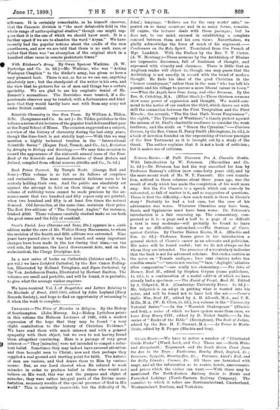THEOLOGIT. —The Place of Miracles in Religion. By the Bishop of
Southampton. (John Murray. 5s.)—Bishop Lyttelton prints in this volume the Hulsean Lectures of 1892, with a modest expression of the hope that they may be found " a very slight contribution to the history of Christian Evidence." We have read them with much interest and with a general sympathy with their object, but we own to not having found them altogether convincing. Here is a passage of very great interest :—" They [miracles] were not intended to compel a reluc- tant belief. Sometimes they may indeed have aroused attention, and thus brought men to Christ; now and then perhaps they supplied a real ground and starting point for faith. The natures of men are various, and God draws them to Him by various means. But, as our Lord showed when He refused to work miracles in order to produce belief in those who would not believe on His word, this was not the purpose and object of miracles ; they were rather integral parts of the Divine mani- festation, necessary results of the specie presence of God in His world." This is eminently reasonable, but the difficulty of St. John's language, " Believe we for the very works' sake," re- peated on so many occasions and in so many forms, remains. Of corase, the lecturer deals with these passages ; but he does not, to our mind, succeed in establishing a complete concord between them and his own views. Nevertheless, we gladly acknowledge the force of much of his argument.— Conferentes on the Holy Spirit. Translated from the French of Mgr. Landriot. With the Preface by the Rev. T. T. Carter. (A. W. Mowbray.)—These sermons by the Archbishop of Rheims are impressive discourses, full of freshness of thought, and expressed with vivacity and clearness. There is little that an Anglican reader will object to, though one may guess that the Archbishop is not exactly in accord with the trend of modern thought. He finds his ideal of the good Christian in the "honest countryman," rather than in the man "who has left his parents and his village to pursue a more liberal 'career in town." —When the Angels have Gone Away, and other Sermons. By the Rev. G. Critchley, B.A. (Elliot Stock.)—These thirteen sermons show some power of expression and thought. We would com- mend to the notice of our readers the third, which draws out with skill the connection between the First Temptation and the First Miracle ; the seventh, " The Sin that Hath Never Forgiveness" ; the eighth, "The Tyranny of Weakness," a timely protest against the misuse of St. Paul's charitable readiness to consider the weak brethren; and the ninth on "Simon the Cyrenian."—Clariora Cariora, by the Rev. Canon H. Percy Smith (Rivingtons, 1s. Cd.), is a book of devotion founded on the expounding of various passages of the New Testament as it is brought out by a study of the Greek. The author explains that it is not a book of criticism ; but it makes use of criticism.






































 Previous page
Previous page